Leaving a village is always a little hard. We departed Rio Azul knowing we’d never be back, but satisfied that our team of nine had made a huge difference in the lives of these 650 villagers.
Each home is now equipped with a “clean air” Aller stove (after the Hands for Peacemaking founder, the late Dr. Leeon Aller of Snohomish County). The school children have the gifts we brought in backpacks, complete with the popular tennis balls and the several new soccer balls. The school has new desks, books, a water tank and even latrines. And several of the villagers can see a little better thanks to the readers we brought.
On the final morning in the village, last Thursday, we visited a couple of stove installations to see them “in action.” (The stoves cannot be fired up right away because it takes time for the tile grout on the shelving to cure). We watched in fascination as the ladies patted tortillas from freshly ground cornmeal and cooked them on their new in-home appliances stoked with firewood. A little of that warmth radiated through us as well.
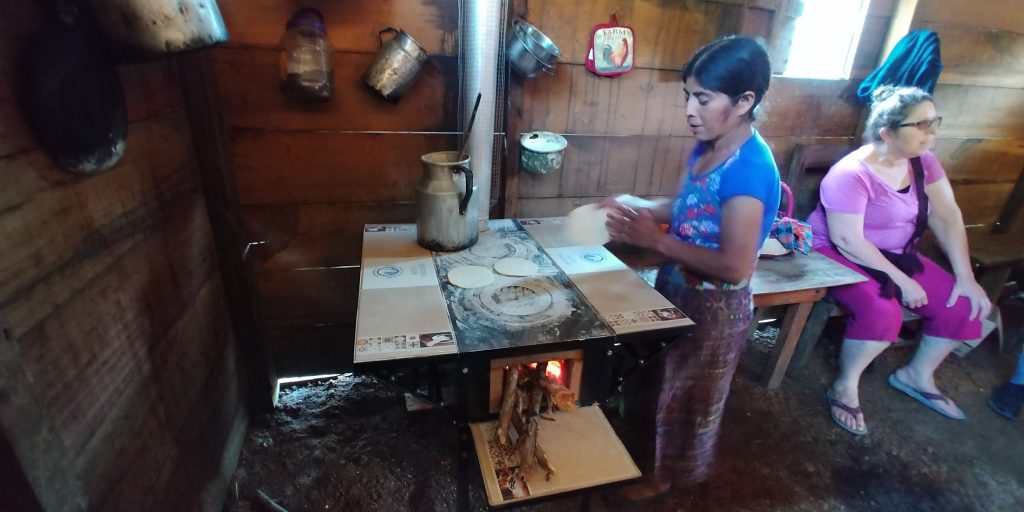
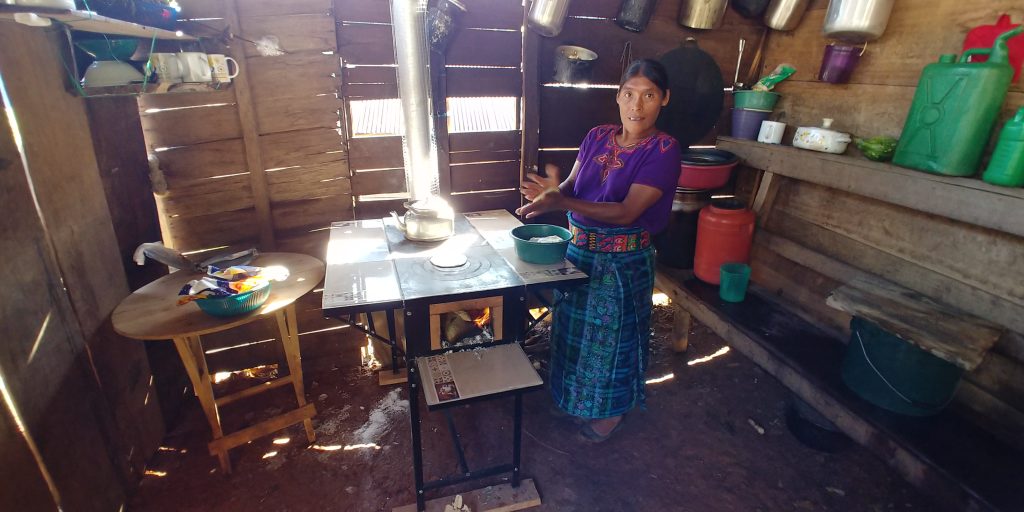
Eye Glasses for All
We then returned to the nearby school compound and set out the eye glasses on two tables, sorting them by strength number with books and needle and thread. Those that knew their language, a Mayan dialect called Chuj, as well as our Spanish speaking team members (mainly Odilia) and staff stood by to help with the fittings. In most cases once a match was found we’d receive nod of thanks and the next villager would step up. A few were picky about color and style. Not all the glasses came with protective cases, but some of the villagers really wanted one so we either tried to accommodate the request or told them the case was not available. After everyone seemed to have what they came for we put out “last call” and suddenly more people lined up. When we realized some were taking multiple pair, or taking glasses they didn’t really need we hastily closed shop.
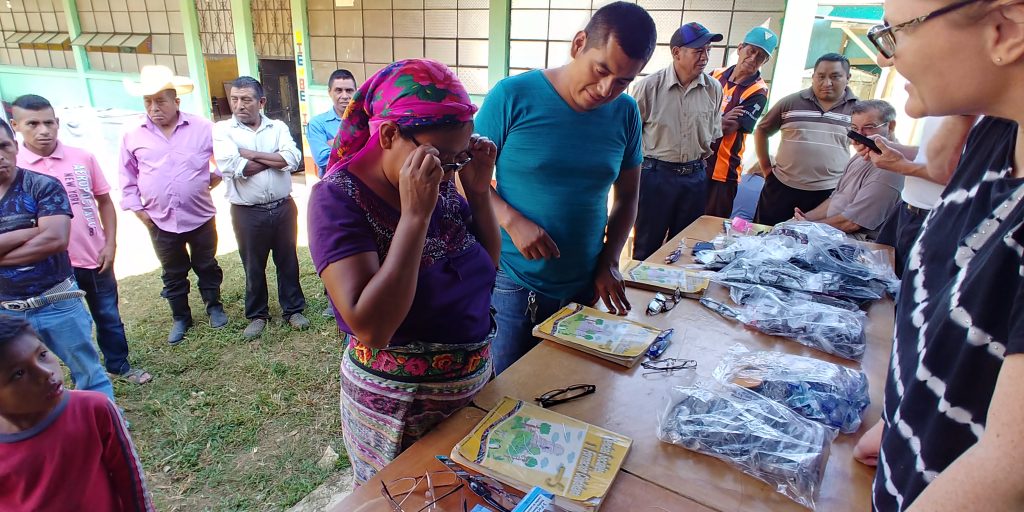
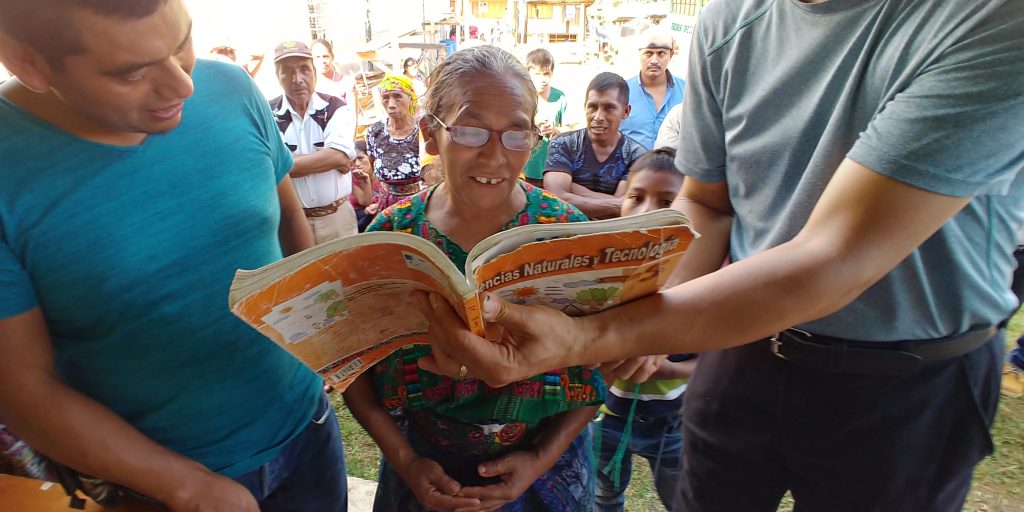
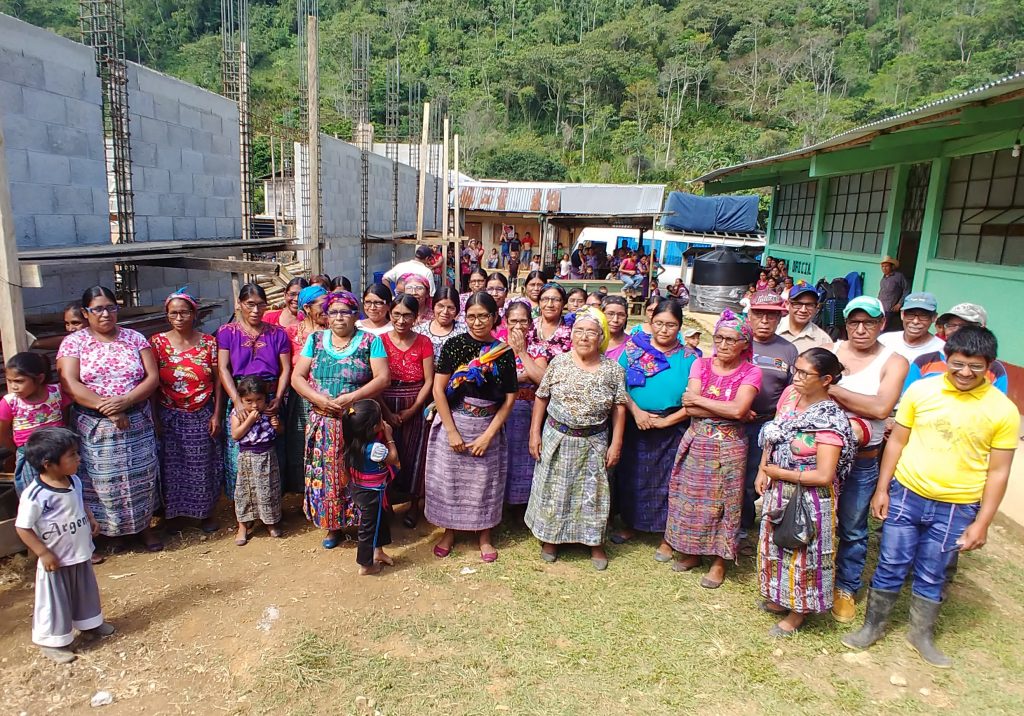
Managing Expectations
For some this village felt a little different than others where we’ve been. As Marco pointed out the village had its roots from a different city, San Mateo Ixtatán, than the villages rooted from Barillas where we have always worked before. In general they were more guarded toward us, and, as at least one team member noticed, maybe not as appreciative of what we were doing for them.
“I felt like we were treated like the Comcast guy coming to fix the cable,” she said bluntly. Opinions naturally varied by personal experience as we worked from home to home. My own stove team with Marco and Fred received plenty of gracias from some homes and not so much from others. Unlike other villages we were not showered with offers of plantain, local juices, soda and bottled water and even roosters for our lunch as before. The children didn’t shout our names as we passed, a common experience in earlier villages.
Perhaps the higher calling of our mission – to serve and help others who live in far humbler circumstances than ourselves – overrides any expectations we may have had going into the village. There must be an appropriate Bible verse about that somewhere I could cite. We were especially touched by the wife of the pastor of the local church who presented Caren and Odilia with purses she had sewn as a sign of her thankfullness on behalf of the village.
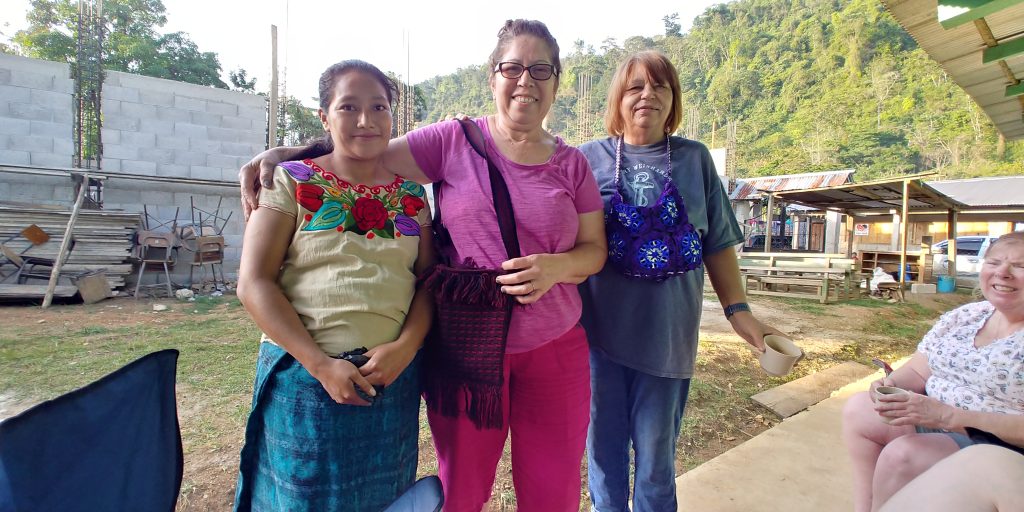
So, with the help of the hard working Hands for Peacemaking staff our mattresses, cooking gear and luggage was packed up. We said our final goodbyes from the villagers – especially the children lined up to see us off – and we bumped back down the road and over the hills in our Coaster bus to Barillas.




Soft Moments
In Barillas we took a tour of the bustling city, checking out the big central market and store fronts and visiting the coffee shop where several ordered coffee to take home and special coffee drinks. I stopped by the local bank to withdraw 1,000 Quetzals (about $130 U.S.). Diane, one of Marine View’s veteran team members who was not able to join this year, read my earlier post about the death of the sister and mother-in-law of two of our Hands for Peacemaking staff members and asked to contribute $100 to help the family. Diane inspired other giving among the team for this cause. Collectively we came up with about $440. I tossed in a little of my own, and decided this would be an appropriate thing to do with the $50 in cash a woman at work had given me. It turns out out gift was very much needed – the 42-year-old woman left behind five kids and a husband who, let’s just say, is not able to fully support his family due to some issues of his own.
That night Elvin, our new shop foreman who left early to attend his mother-in-law’s funeral, knocked on the door of the mission house as we were finishing dinner. Teary-eyed with gratitude, he thanked us all profusely for our kindness toward his family. Our gifts will make a huge difference for them, he tells us in Spanish.
Later that evening we had another sad moment. This was the last day on the job for a staff member who has been with Hands for Peacemaking for 15 years, a valued, trusted and highly skilled employee.
He is leaving to seek his fortunes in the United States – that is if he is lucky enough to make it. I won’t say his name for his own protection as he is taking a huge risk, so let’s call him Antonio.
Antonio’s last days with Hands for Peacemaking included being the staff stove installation assistant to team members Tom and Suzy. Since Antonio supervised the Aller Skills Center where the stoves are made they teased him mercilessly if he made the slightest mistake. When everything came together well Antonio used a phrase he coined: Mui Awesome. He has been a favorite of many of the Hands for Peacemaking teams who have visited through the years.
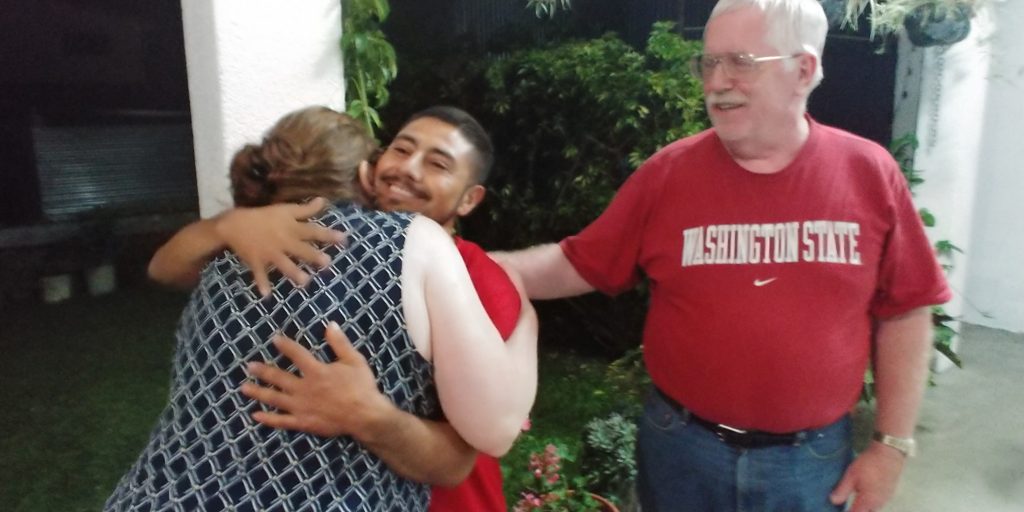
Antonio has tried thrice to obtain a U.S. visa, and denied each time. The cayotes, or human traffickers, are telling Guatemalans that due to the U.S. clamp-down on illegal immigrants now is the time to make a run for the border, and offering big discounts on their services to help them get here. Antonio, just like two of his co-workers earlier, has made a decision to go, despite offer of more money and warnings that he may may face severe consequences if he does not make it. One of his longtime co-workers who made a similar decision already landed in a Mexican jail and was shortly deported back to Guatemala. He will likely try again.
While Hands for Peacemaking pays a competitive local wage and offers steady work in the Aller Skills Center in Barillas, the lure of possibly improving one’s circumstances in the U.S. is simply too strong. Antonio has already been replaced and knows he will not have a job to return to if things do not work out – he will take his son and go anyway. His decision is final so, with a heavy heart, we said goodbye and Godspeed to our dear friend.
Diego
To help understand Antonio’s decision let’s go back to the village of Rio Azul and meet Diego. At 27, Diego, one of the leaders who installed stoves with us, is one of the wealthiest men in the village. In the midst of a hamlet comprised largely of small homes with dirt floors and tin roofs, Diego owns a big, two story home made of stucco and concrete, with ornate tile flooring throughout with a well-stocked tienda (Spanish for store) on the side. He has a husky gas-powered generator for power and fine furniture and tools. He owns a shiny new red pickup truck which he parks across the street. He owns another house down the road. You might say Diego is the envy of the town.
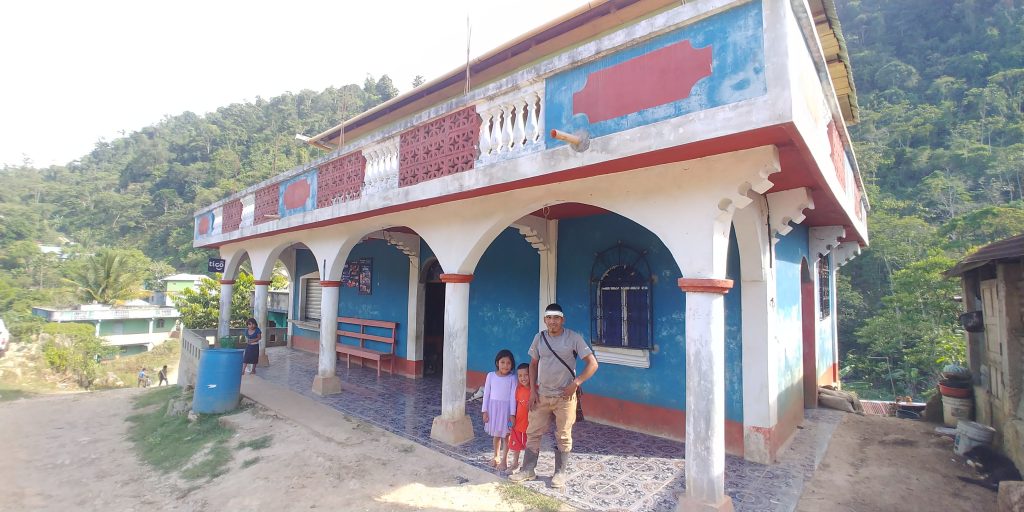
But how did he acquire such wealth? Diego worked for four years in the United States – likely without papers – on a Mississipi chicken ranch. I did not ask what he made, but let’s assume $10 an hour. So for simplicity’s sake if he worked 10 hours per day he would be banking nearly $100, well over 10 times what his wages might be back home. Most likely he would not have paid any taxes on that, and would have been able to live quite frugally if he was in shared housing on the ranch and they supplied the meals. Again an assumption. Anyway, Diego brought back enough to live a pretty good lifestyle and support his young family with his earnings.
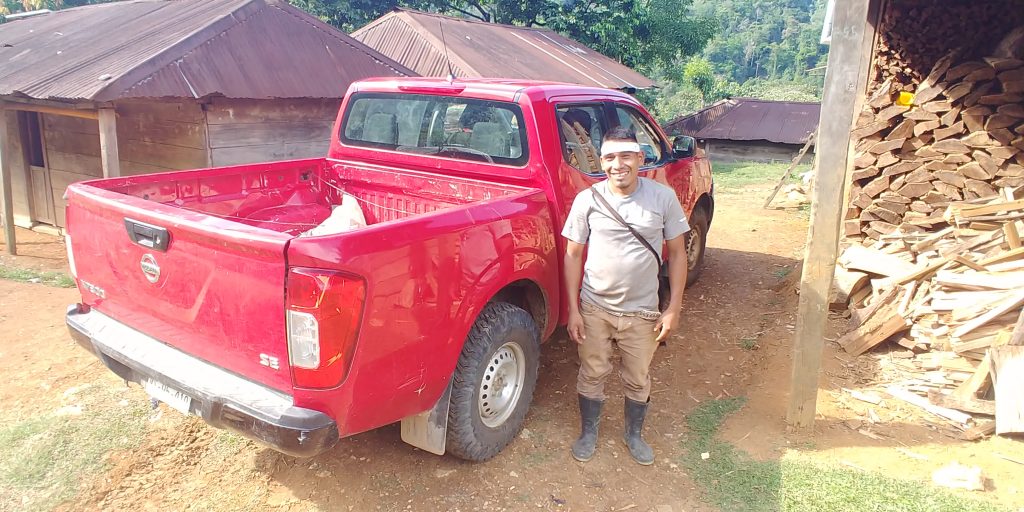
In the U.S. we generally frown on illegal immigration (some more than others). The culture in Guatemala embraces it. While driving later in the week to look at some property in the Department (state) of Quetzaltenango we saw a big statue erected to the honor of illegal emigrants.
As Marco explains, people like our Antonio who work very hard for their wages in Guatemala see that their countrymen (and women) who work in the United States have so much more to show for their labors. The lure is strong, and for some impossible to resist despite the potential consequences. The common thing to do now is go to the border, surrender to U.S. immigration authorities and ask for asylum. Their case becomes stronger if they have their children with them.
Final Days
On Friday morning four of us joined Marco in the Hands for Peacemaking pickup truck for the long, long drive from Barillas to Queztaltenango, while the rest were with Willy in a rented vehicle to go straight to the resort city of Panajachel on lovely Lake Atitlan. (Hands for Peacemaking would like to open a new, more centrally located stove manufacturing facility and Marco wanted me as board chair to meet with an association that has some property for lease and take a look at the property itself).
We all met up that night at the Hotel La Riviera de Atitlán, a wonderful resort right on the lake with expansive vistas of three volcanos from its three 14-story towers.
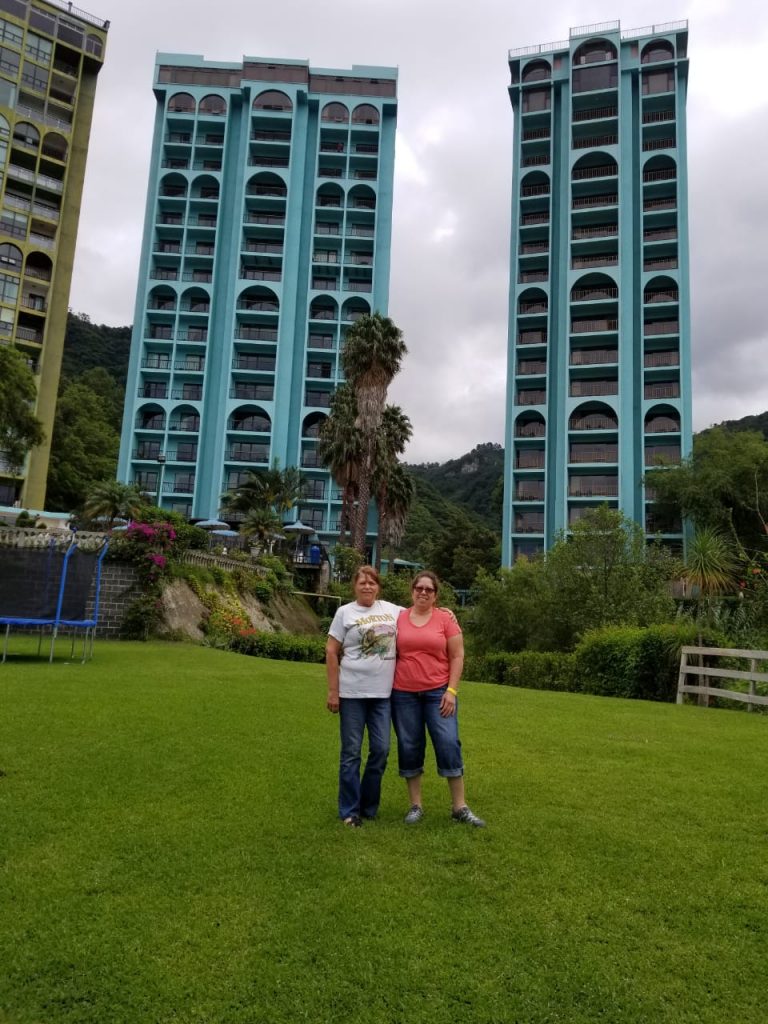
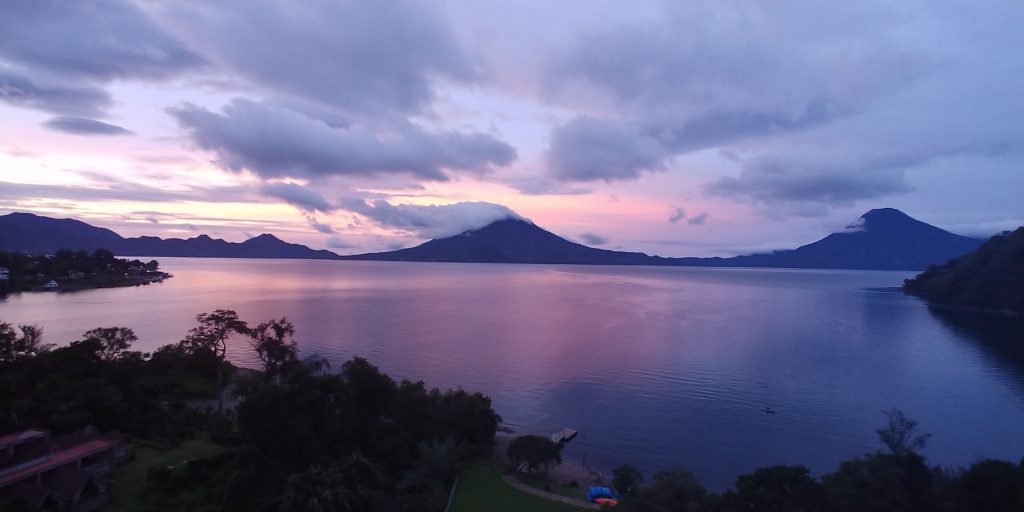
We grabbed a late dinner and the next morning most of us rose early for a hike in the nearby nature preserve and strolled through a butterfly house on site.
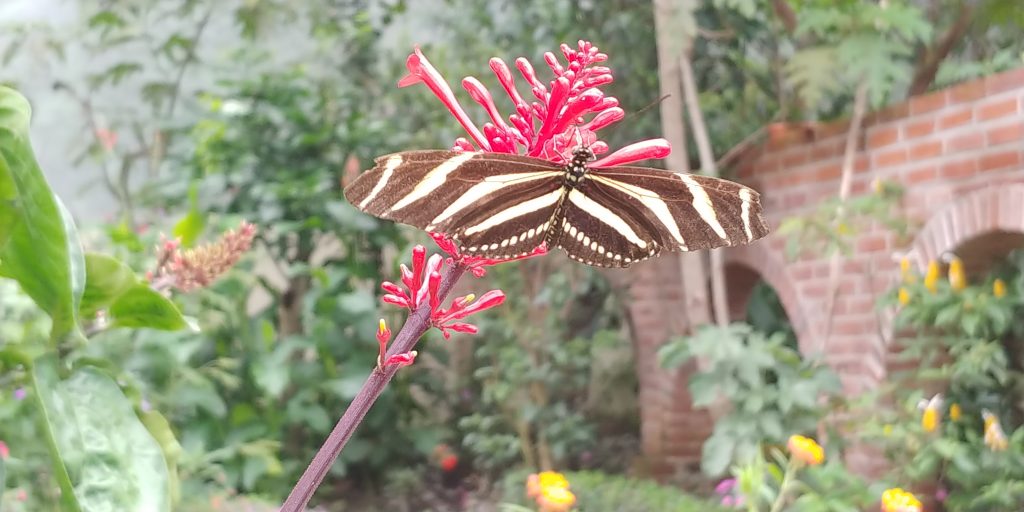
We then hailed a lancha (boat) to take us to Santiago, about a half-hour ride away, to do some shopping and have lunch. By this time we had made the full conversion from short-term missionaries to tourists. We dodged a little rain but no one seemed to mind.
One of our team members somehow separated from us as we were returning to the boat. While we waited for her the wandering street vendors became more and more agressive, noisily laying their colorful blankets and other goods over the gunwales while we tried as gently as we could to tell them to get lost. Loren had actually purchased something from one earlier, inciting them to circle around the rest of us like sharks after a wounded seal. Once Marco went back up the hill to retrieve our missing team member we were finally able to make our escape.
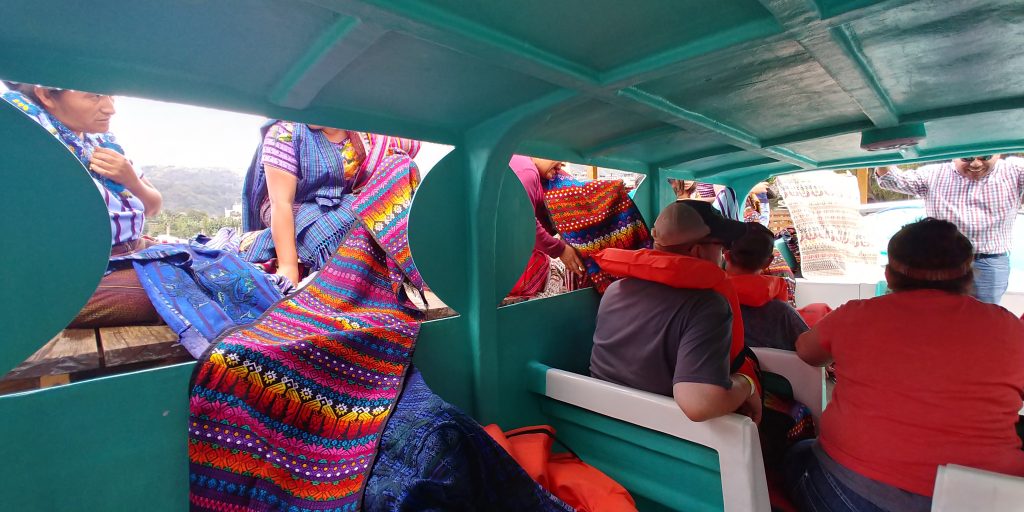
We dined that Saturday night at the El Tenedor del Cerro in Antigua, the original capital city where we would spend our final night. Marco and Willy bestowed our three non-veteran team members with Hands for Peacemaking plaques made by a Barillas woodcarver who is severely disabled from a fall. We were joined at dinner by Odilia’s brother, sister-in-law and nephew who live in nearby Guatemala City.
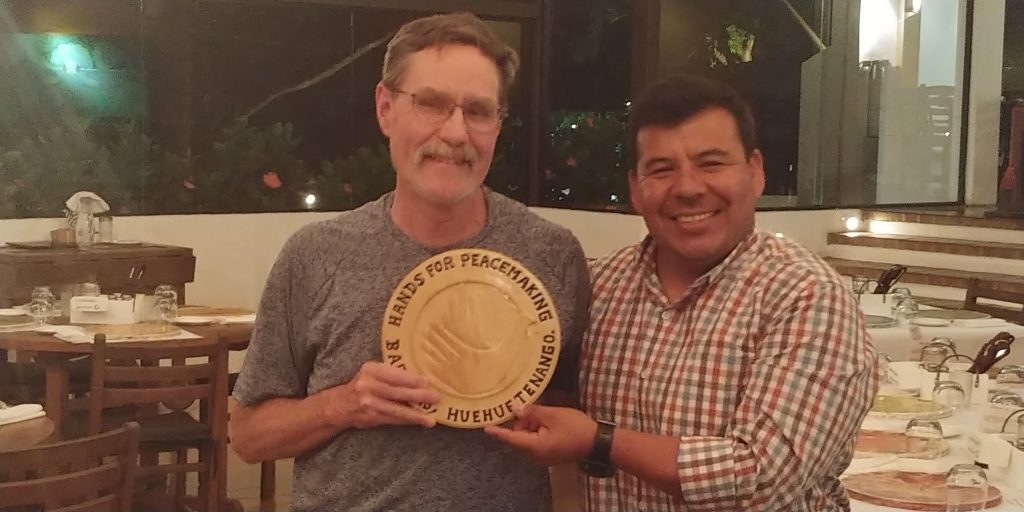
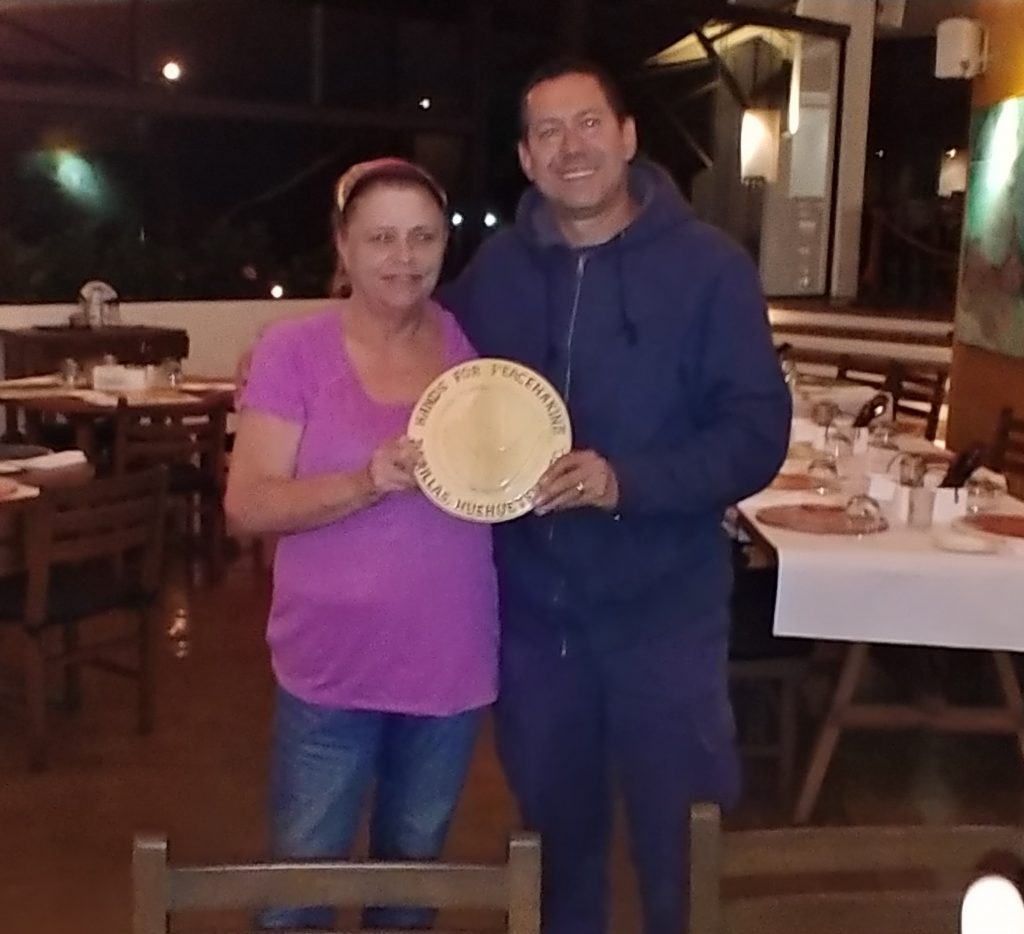
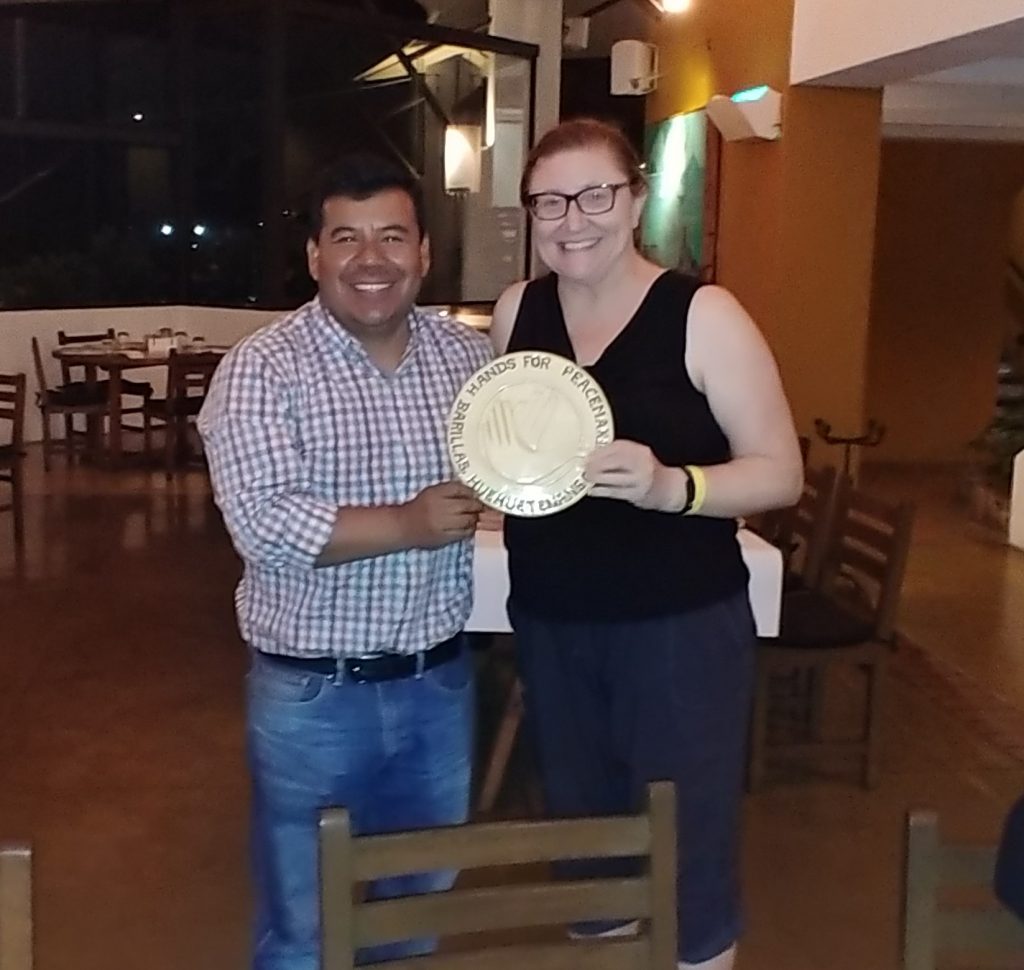
As our flight was at noon we had a little time in the morning to pack and prepare, although Loren and Caren had to leave earlier for their separate flight. Tom and Suzy’s niece, Mackenna Cameron, was competing with the U.W. women’s crew team in Indianapolis that morning, sitting third seat on the Varsity 2 boat as a freshman. We were able to huddle around Tom’s mobile phone and watch live as all three of the U.W. women’s boats pulled out front, together sweeping the NCAA women’s rowing national championship for the second time in three years! (We had to explain to others around us what we were all screaming about). Tracy and Terrie, our two team members from Marysville, decided to stay a couple of extra days for sightseeing in Antigua so Marco took the rest of us to the airport and we said our final and fond farewells to him.
I appreciate those of you who have followed along on this blog. Once more, this trip would not have been possible without so many of you, so the blog is a way of sort of bringing you along. It is my hope that you may decide to join us, or even think about mobilizing your own team to work in Guatemala next year. It is not too early to start planning.
Many who have gone before have stated the opportunity has changed their lives. I know it has for me and for others who have been a part of this mission. Thank you for being part of it too.
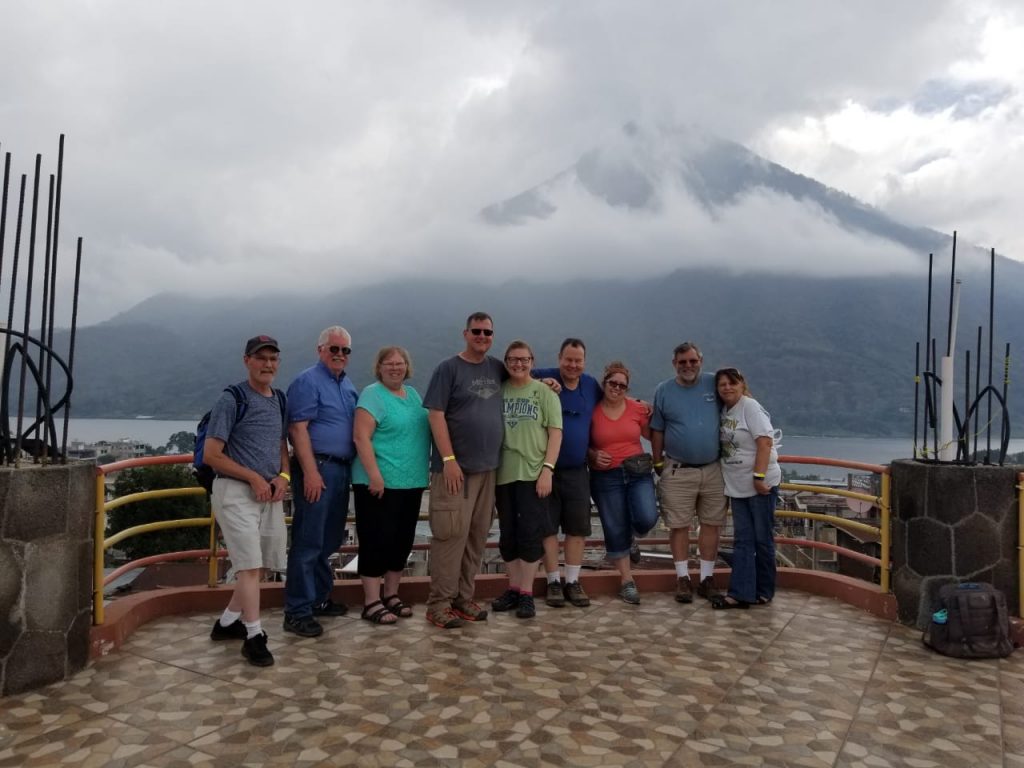
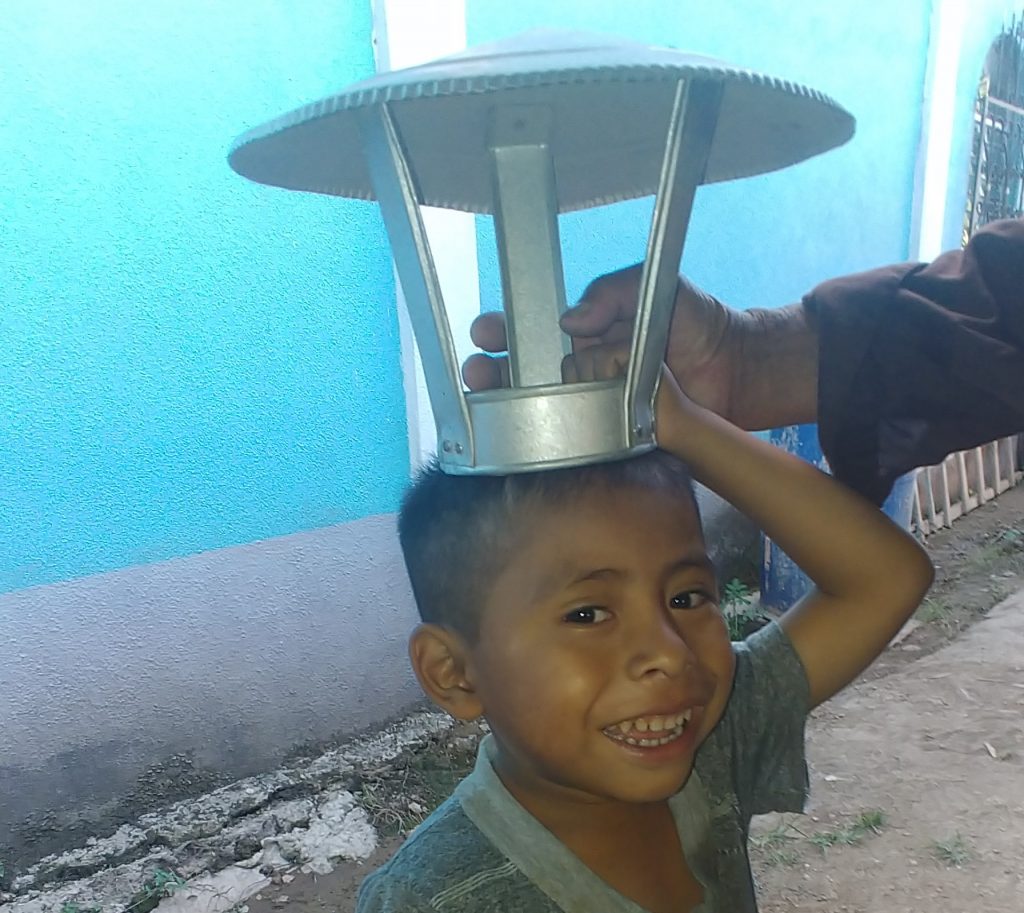

Great wrap-up report, Brian.
Brian, you write so well that I truly feel like I was with your group too. Fred came home with such an appreciation for learning and being immersed in this work/tour mission. Please continue to update us this coming year as to supplies or support for the next trip.
Brian,
I appreciate the fair and honest report. You can have an excellent team and do worthwhile work. We will miss “Antonio” too. Thank what you did for Elvin and for your efforts. Best, Kathy Cox
Thank you Brian and the whole team.
There is a big blessing and satisfaction for you all to have the job in Rio Azul well done.
When we were reading your last report and beautiful pictures of the villagers, it gave us great joy. Our hearts were touched seen how many villagers lives were touched in differents ways.
God bless you all,
Thanks again!
Thanks, Brian, for taking us along with the team. Well done!
Brian, thank you for once again not only communicating the facts, but telling the stories behind them. The facts may be the meal, but the stories add the flavor! Wonderful job, and greatly appreciated!
Thanks Kay!